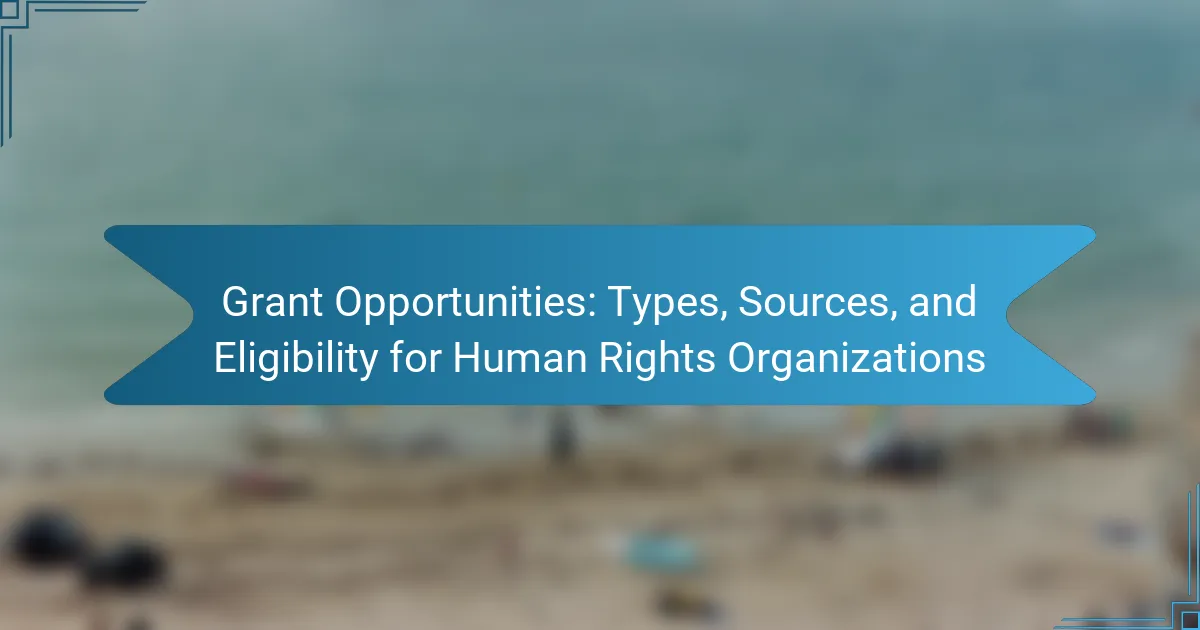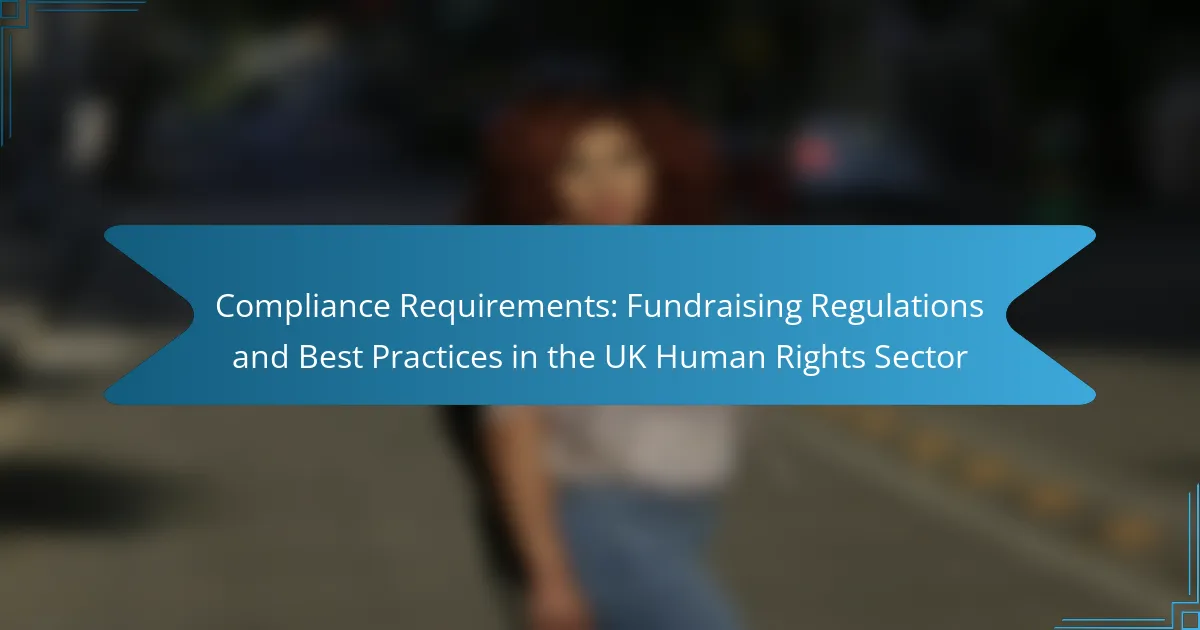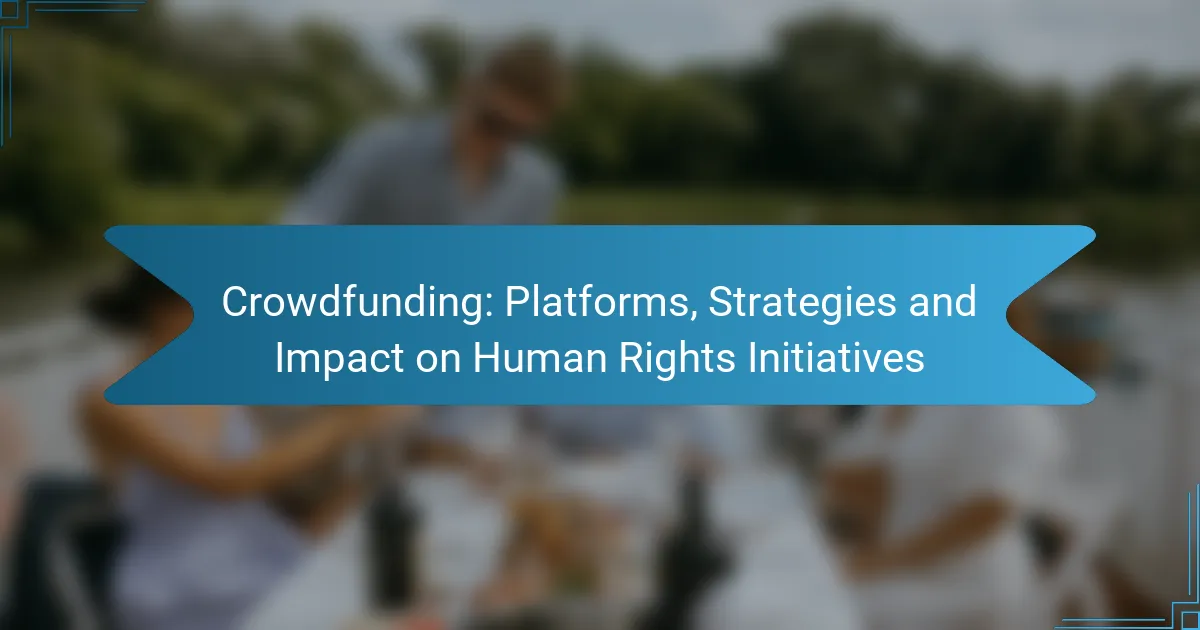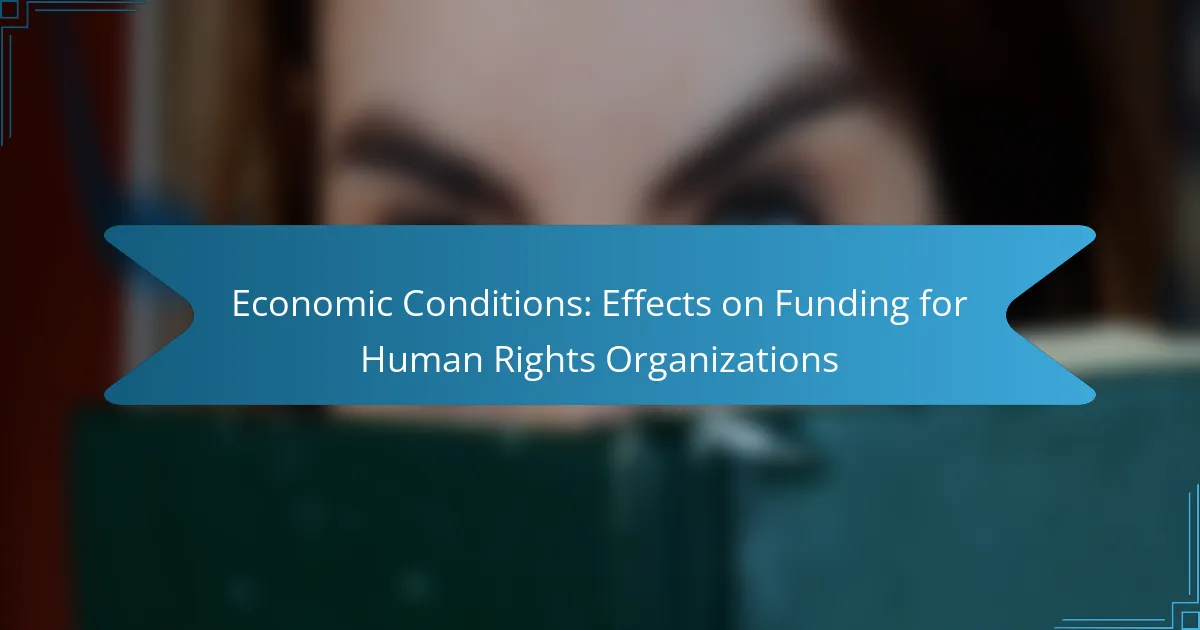Human rights organizations have access to a diverse range of grant opportunities, including government, private foundation, and corporate sponsorships, each with distinct eligibility requirements and application processes. Identifying potential funding sources can be achieved through online databases, networking, and workshops. Understanding the specific eligibility criteria set by funders is crucial for organizations aiming to secure financial support for their initiatives.
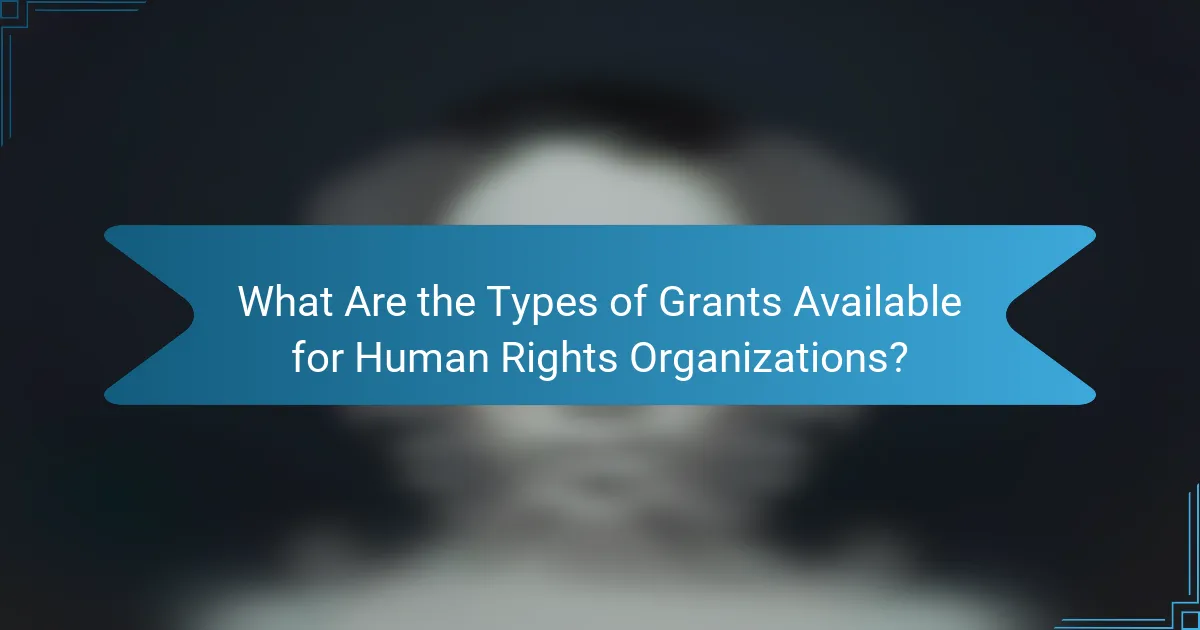
What Are the Types of Grants Available for Human Rights Organizations?
Human rights organizations can access various types of grants to support their initiatives, including government grants, private foundation grants, international organization grants, crowdfunding initiatives, and corporate sponsorships. Each type has unique eligibility criteria, funding amounts, and application processes that organizations must navigate to secure financial support.
Government Grants
Government grants are funds provided by national, regional, or local governments to support human rights initiatives. These grants often require organizations to meet specific eligibility criteria, such as being a registered nonprofit and demonstrating a clear impact on human rights issues.
Organizations should be aware of the application process, which typically involves submitting detailed proposals, budgets, and reports on expected outcomes. Examples include grants from agencies like the U.S. Department of State or the European Commission, which can range from thousands to millions of USD depending on the project scope.
Private Foundation Grants
Private foundation grants are offered by philanthropic organizations and individuals who fund specific causes, including human rights. These grants can vary significantly in size and focus, often targeting specific issues such as gender equality, refugee rights, or social justice.
To secure funding, organizations should research foundations that align with their mission and tailor their proposals accordingly. Notable foundations include the Ford Foundation and the Open Society Foundations, which provide substantial support for impactful human rights work.
International Organization Grants
International organizations, such as the United Nations or the World Bank, offer grants to support human rights initiatives globally. These grants often focus on projects that align with international human rights standards and can provide substantial funding for large-scale projects.
Organizations seeking these grants must demonstrate how their work contributes to broader international goals. Applications may require collaboration with other organizations or stakeholders, and funding can range widely based on project needs and organizational capacity.
Crowdfunding Initiatives
Crowdfunding initiatives allow human rights organizations to raise small amounts of money from a large number of people, typically via online platforms. This approach can be particularly effective for specific projects or campaigns that resonate with the public.
Organizations should create compelling narratives and utilize social media to reach potential donors. Successful crowdfunding campaigns often set clear funding goals and offer incentives for contributions, making it an accessible option for organizations of all sizes.
Corporate Sponsorships
Corporate sponsorships involve partnerships between human rights organizations and businesses that provide financial support in exchange for brand visibility or alignment with social causes. These partnerships can be mutually beneficial, enhancing corporate social responsibility while funding important initiatives.
Organizations should approach companies whose values align with their mission and propose sponsorship opportunities that highlight the impact of their work. It’s essential to maintain transparency and ensure that the partnership does not compromise the organization’s integrity or mission.
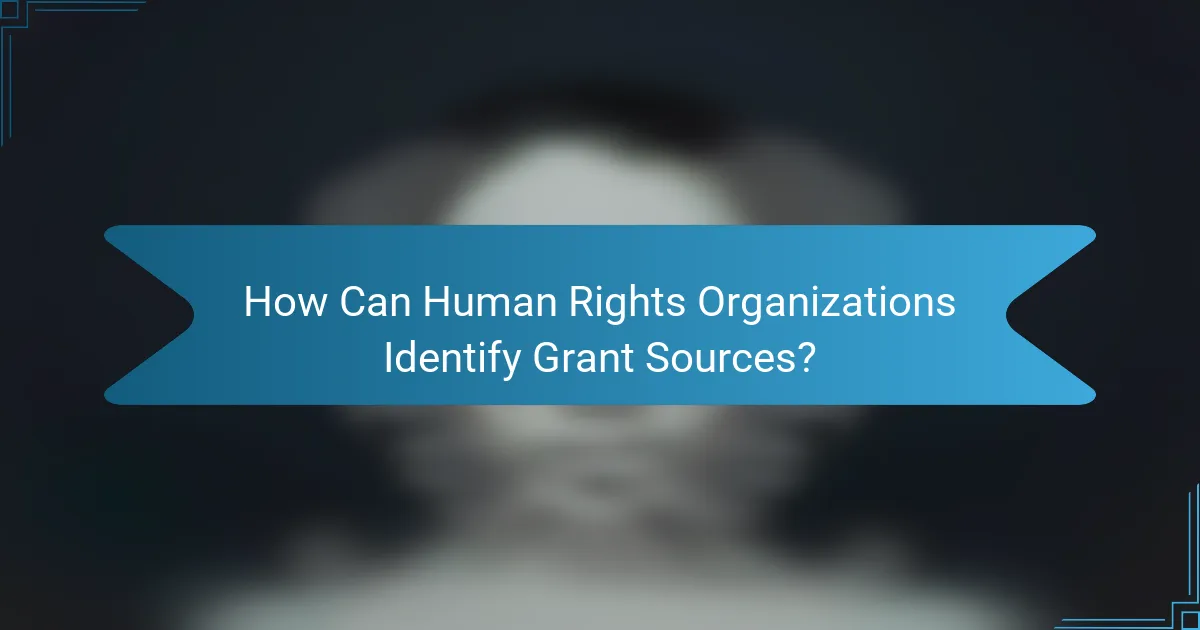
How Can Human Rights Organizations Identify Grant Sources?
Human rights organizations can identify grant sources through various channels that provide access to funding opportunities. Utilizing online databases, networking with other NGOs, attending workshops, and exploring government websites are effective strategies for discovering potential grants.
Online Grant Databases
Online grant databases are comprehensive resources that compile funding opportunities from various sources. Organizations can search these databases using keywords related to their mission, such as “human rights” or “social justice,” to find relevant grants.
Some popular databases include Grants.gov, Foundation Center, and GrantWatch. These platforms often allow users to filter results by location, funding amount, and eligibility criteria, making it easier to find suitable options.
Networking with Other NGOs
Networking with other non-governmental organizations (NGOs) can uncover hidden grant opportunities. By building relationships with peers in the human rights sector, organizations can share insights and experiences regarding successful funding sources.
Participating in conferences, seminars, and local meetups can facilitate these connections. Additionally, joining coalitions or alliances focused on human rights can provide access to collective resources and shared grant information.
Grant Writing Workshops
Attending grant writing workshops can enhance an organization’s ability to secure funding. These workshops often cover best practices for writing proposals, understanding funder expectations, and tailoring applications to specific grants.
Many organizations offer free or low-cost workshops, and some may even provide one-on-one coaching. Investing time in these educational opportunities can significantly improve the quality of grant applications and increase the chances of funding success.
Government Websites
Government websites are valuable sources for grant opportunities, particularly for organizations focused on human rights. National and local governments often have dedicated sections for grants and funding aimed at NGOs.
For example, in the United States, Grants.gov lists federal funding opportunities, while the European Union has its own funding programs for human rights initiatives. Regularly checking these websites can help organizations stay informed about new grants and application deadlines.

What Are the Eligibility Criteria for Grants?
Eligibility criteria for grants vary by funder but generally include requirements related to organizational status, project focus, geographic area, and alignment with the funder’s mission. Understanding these criteria is essential for human rights organizations seeking funding.
Non-Profit Status
Most grant providers require organizations to have non-profit status, often verified by documentation such as a 501(c)(3) designation in the United States or equivalent in other countries. This status demonstrates that the organization operates for charitable purposes rather than for profit.
Some funders may also consider community-based organizations or social enterprises, but these typically need to show a clear commitment to social impact. Ensure your organization maintains proper records and complies with local regulations to meet this criterion.
Project Specificity
Grant applications usually require a clearly defined project with specific goals and measurable outcomes. Funders want to see how their investment will lead to tangible results, so detailed project plans and timelines are crucial.
When outlining your project, include information on the target population, the methods you will use, and the expected impact. This specificity helps funders assess the feasibility and relevance of your proposal.
Geographical Focus
Many grants are restricted to specific geographic areas, whether local, national, or international. Human rights organizations must ensure that their projects align with the geographical focus of the funding source.
Research potential funders to understand their geographic priorities. For example, some may only fund projects in developing countries, while others may focus on urban areas in developed nations. Tailor your proposals accordingly to meet these geographical requirements.
Alignment with Funders’ Goals
Successful grant applications demonstrate alignment between the organization’s mission and the funder’s goals. Funders often have specific areas of interest, such as gender equality, refugee rights, or environmental justice, and they prioritize projects that resonate with these themes.
Review the funder’s mission statement and past funding history to identify common themes. Craft your proposal to highlight how your project supports their objectives, increasing the likelihood of receiving funding.
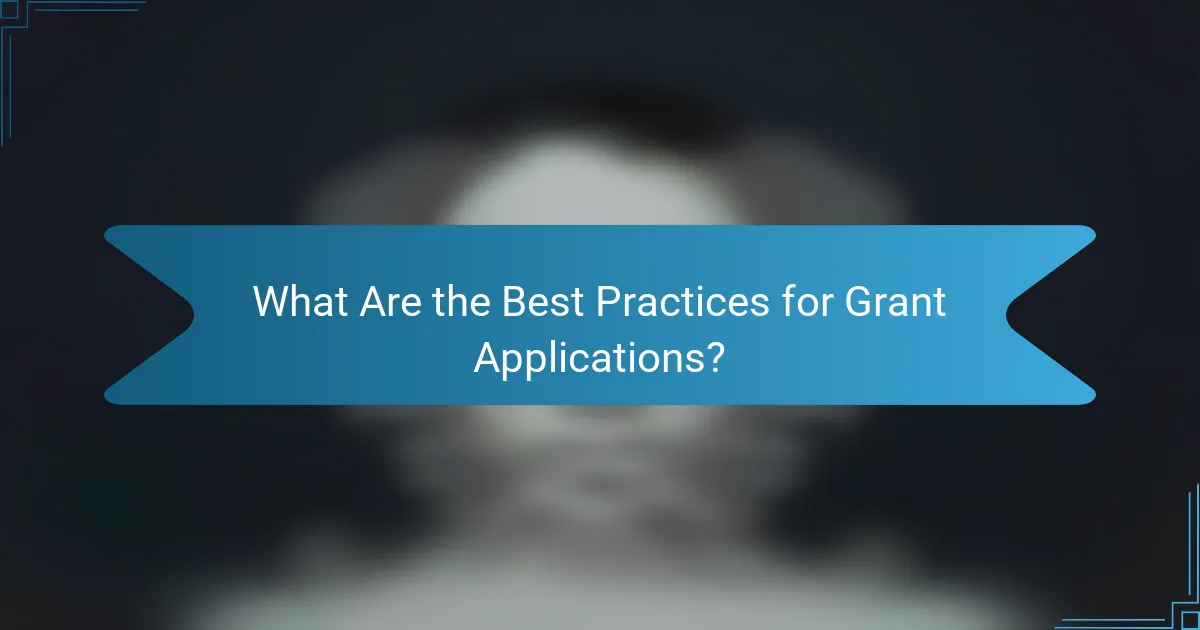
What Are the Best Practices for Grant Applications?
Best practices for grant applications involve clearly defining project goals, providing a detailed budget, demonstrating the need for the project, and outlining measurable outcomes. Following these guidelines can significantly enhance the chances of securing funding.
Clear Project Objectives
Clearly defined project objectives are crucial for grant applications as they outline the specific goals and outcomes the organization aims to achieve. Objectives should be SMART: Specific, Measurable, Achievable, Relevant, and Time-bound. For example, instead of stating “improve community awareness,” specify “increase awareness of human rights issues in the community by 30% within one year.”
When crafting objectives, ensure they align with the mission of the organization and the priorities of the funding body. This alignment demonstrates that the project is not only feasible but also relevant to the funder’s goals.
Detailed Budget Justification
A detailed budget justification is essential to explain how funds will be allocated and why each expense is necessary. Break down costs into categories such as personnel, materials, and overhead, providing a clear rationale for each item. For instance, if requesting funds for training sessions, include costs for facilitators, materials, and venue rental.
Be transparent about potential indirect costs and ensure that the total budget aligns with the funding limits set by the grantor. Avoid vague estimates; instead, provide specific figures and sources for your budget calculations to enhance credibility.
Strong Evidence of Need
Demonstrating a strong evidence of need is vital for convincing funders that your project addresses a significant issue. Use data, case studies, and testimonials to illustrate the problem and its impact on the community. For example, citing statistics on human rights violations in your area can effectively highlight the urgency of your project.
Incorporate local context by referencing relevant studies or reports that resonate with the funder’s interests. This localized approach not only strengthens your case but also shows that you are aware of the broader landscape in which you operate.
Measurable Outcomes
Measurable outcomes provide a way to evaluate the success of the project and demonstrate accountability to funders. Define clear metrics that will be used to assess progress, such as the number of workshops held, participants reached, or changes in community attitudes. For instance, aim to collect pre- and post-surveys to quantify shifts in awareness or behavior.
Ensure that these outcomes are realistic and achievable within the project timeline. Establishing a plan for ongoing evaluation will not only help in reporting to funders but also in refining future projects based on learned experiences.
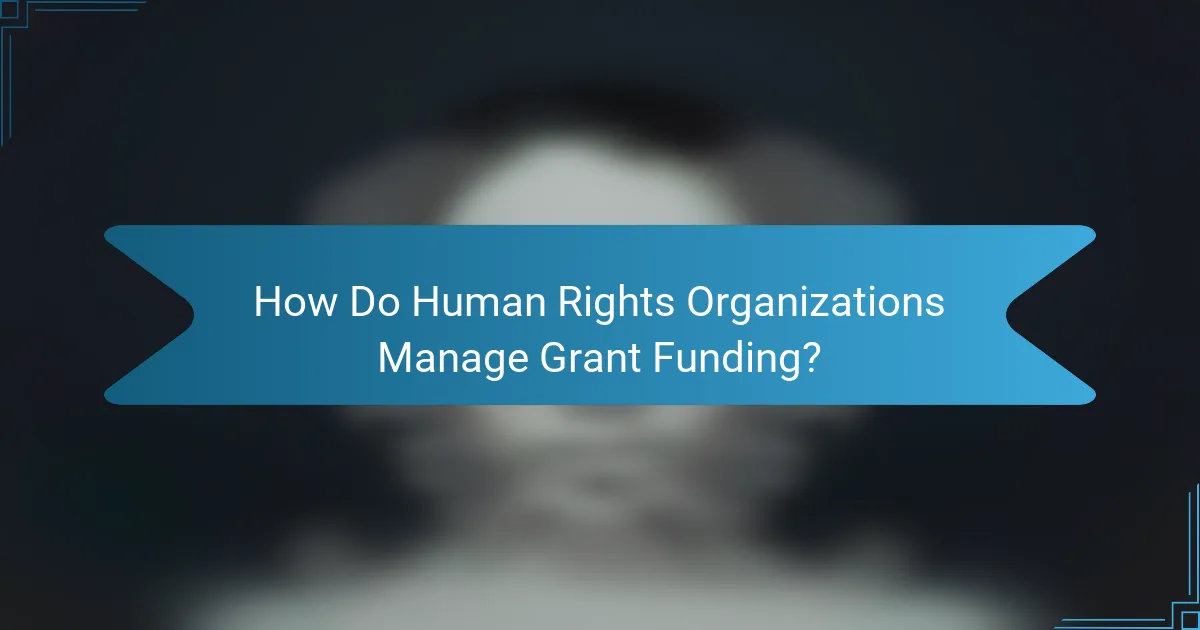
How Do Human Rights Organizations Manage Grant Funding?
Human rights organizations manage grant funding by strategically identifying, applying for, and utilizing financial resources to support their missions. Effective management involves understanding the types of grants available, their sources, and the eligibility criteria that govern them.
Types of Grants Available
Human rights organizations can access various types of grants, including project grants, operational grants, and capacity-building grants. Project grants are typically designated for specific initiatives, while operational grants support the overall functioning of the organization. Capacity-building grants focus on enhancing the skills and resources of the organization to improve its impact.
Each type of grant serves different purposes and may come with unique requirements. For instance, project grants often require detailed proposals outlining objectives and expected outcomes, while operational grants may necessitate a broader overview of the organization’s mission and activities.
Sources of Grant Funding
Grant funding for human rights organizations can come from various sources, including government agencies, private foundations, and international organizations. Government grants may be available at local, national, or international levels, often with specific eligibility criteria and application processes.
Private foundations and corporations also provide funding, usually focusing on particular issues or geographic areas. Organizations should research potential funders to align their missions with the interests of these funding sources, increasing their chances of securing support.
Eligibility Criteria for Grants
Eligibility criteria for grants can vary widely depending on the funding source and type of grant. Common criteria include organizational status, geographic focus, and the specific human rights issues addressed. Many funders require organizations to be registered non-profits or have a certain level of operational history.
To enhance eligibility, organizations should ensure compliance with any regulatory requirements and maintain transparency in their operations. Understanding the specific criteria for each grant opportunity is crucial for successful applications.
